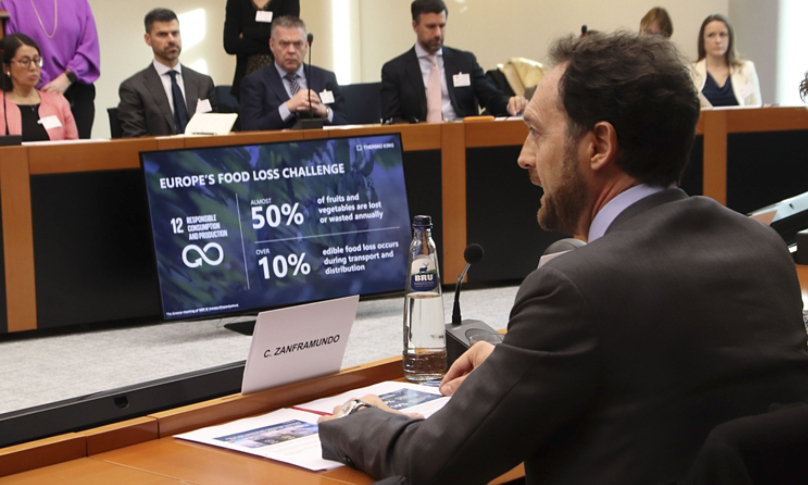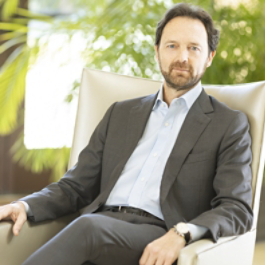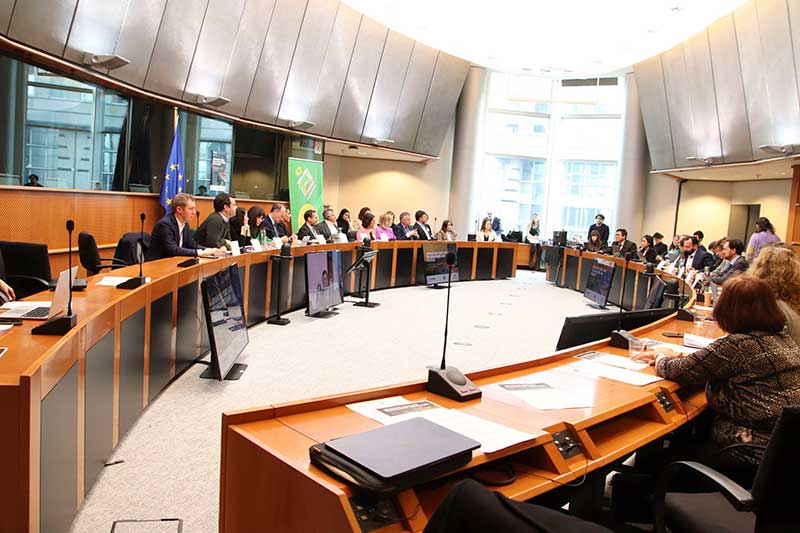
Our EnvironmentArticle
Mitigating Food Loss with a Smarter Cold Chain
May 02, 2024

Our EnvironmentArticle
May 02, 2024
Earlier this year, I was honored to participate in a round table event at the European Parliament on Advancing Food Loss Technologies and Policies.
The round table was hosted by Member of the European Parliament Rosa D’Amato and co-developed by Trane Technologies in partnership with Sustainable Development Policy Institute Competere. Experts from agribusiness, food production and distribution addressed the global impact of food loss on people and our planet — and shared input on how we can accelerate the reduction of food loss by partnering together and using the technologies that exist today.
Globally, 30% of food is lost or wasted. At the same time, 10% of global greenhouse gas emissions come from food loss and waste, and over 10% of edible food loss and waste occurs during distribution. Food loss is as much an environmental issue as it is a societal and economic issue. Decarbonization of the cold chain and commercial transport industry, and reduction of food loss is essential and is possible. Adoption of electrification, renewable power and digital solutions in transport refrigeration should be accelerated. We must all work together and adopt existing technologies for the sake of our planet and future generations.
As a global climate innovator, our businesses and brands directly impact greenhouse gas emissions. That’s why Thermo King® introduced electrification to the refrigerated transport industry decades ago and why we have continued to innovate and lead the market with fully-electric solutions for every step of the cold chain in the Europe, Middle East, Africa (EMEA) region. Guided by Trane Technologies’ bold 2030 commitments, we are helping our customers transition to more sustainable fleet solutions while reducing their carbon footprints.
And we are also the only company that delivers end-to-end connected, active temperature-controlled transport and temporary storage solutions across the entire cold chain: whether by air, ocean or land.
Our technologies offer a solution to not only prevent food loss, but to do so using less energy—reducing emissions in the process.
Our technologies offer a solution to not only prevent food loss, but to do so using less energy—reducing emissions in the process.

One example of the revolutionary technology available today is our AxlePower solution, which combines a fully electric refrigeration unit, highly efficient battery storage and the ability to run on low or zero-emissions power sources, such an axle energy recovery system, shore power or hybrid system. This trailer refrigeration system allows the unit to operate autonomously and keep the cargo at optimal temperature, even when the vehicle is not running. It is a fully electric, no fuel consumption trailer refrigeration solution, which is powered by the road – an easy to adopt game changer.
Having an efficient and sustainable cold chain makes a big difference in reducing food waste and putting food on tables around the world. It’s vital that policy makers and industry leaders – from farm to fork – connect regularly, so we can work together to make progress on this important issue from all angles.
The European Commission has launched a series of campaigns and efforts to reduce food waste at retail and consumer levels, in line with the EU’s commitment to halve per capita global food loss and waste by 2030.
As we work to meet our own ambitious 2030 Sustainability Commitments, we recognize that our technologies can also play a critical role in supporting food loss reduction goals.
The magnitude of the pandemic put the global cold chain under enormous strain and included a set of new challenges for ensuring a safe, reliable cold chain to transport food or medicines. We learned a lot from those years: During extremely challenging conditions, we never stopped production in our factories; we continued to meet our customers’ transport refrigeration needs; and we leveraged digital solutions to enhance the cold chain effectiveness.
The digital strategies and technologies that helped us build a safer and more reliable cold chain can also play a role in reducing food loss.
Transporting perishable items requires precise temperature control. Even the slightest variance in temperature can cause food to spoil prematurely. Our digital solutions allow us and the customer to monitor and control temperatures during transport to extend freshness and prevent spoilage. The system, Thermo King ThermoKare, provides full service and maintenance via telematics, including remote diagnosis and expert support. We can document that the cargo was kept in temperature range. Customers also receive food safety reports to help them comply with food safety and hygiene protocols.

During the round table discussion, we heard more about European Union policies and strategies through discussion moderated by Alexandra Nikolakopoulou, Head of Unit DGSANTE of the European Commission, and we explored the causes of food loss and waste with Associate Professor Kasza Gyula. Joining the conversation were representatives from Copa Cogeca, the organization for farmers and agri-cooperatives in the EU; leading European food manufacturers association FoodDrinkEurope; major European retail organization Schwarz Group; surplus food management app-based company Too Good To Go; and Safe Food Advocacy Europe (SAFE), an NGO focused on protecting EU food consumers.
One thing became clear from all the voices at the table: We are in action mode. We don’t want to be passengers on the road to a more sustainable future. Thermo King and Trane Technologies are leading the way with sustainable innovation. By working together, we can accelerate the adoption of available technologies that mitigate food loss while also reducing the environmental impact of the cold chain.
Recommended for you
Our Environment Article
The Power of PartnershipOctober 25, 2024
We amplify our impact on issues from global climate action to local community needs through our partnerships.
This article is co-authored by Deidra Parrish Williams, Global Corporate Citizenship Leader, Trane Technologies.
Our Environment Article
Trane Technologies Tackles Embodied Carbon at UNGA Goals HouseOctober 14, 2024
Trane Technologies VP of Sustainability Scott Tew discusses the company’s move to reduce embodied carbon at UNGA Goals House at Climate Week NYC 2024.
Our Environment Article
Leading on Embodied CarbonSeptember 23, 2024
Trane Technologies’ sustainability and procurement leaders on the company’s move to reduce embodied carbon by 40%.
This article is co-authored by Kinnar Ghiya, Vice President, Procurement, Trane Technologies.
Our Environment Article
Building a MovementJune 17, 2024
The technology exists today to decarbonize the built environment. How will we get to net-zero? Together.